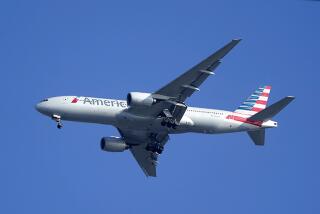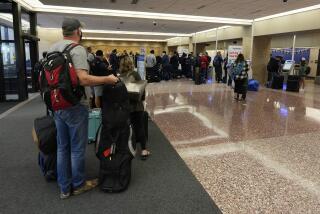FCC OKs Plan to Trim Fees on Overseas Calls
WASHINGTON — In a move intended to save consumers billions of dollars a year, the Federal Communications Commission approved rules Thursday aimed at lowering the fees U.S. long-distance companies pay foreign carriers to complete international calls.
If foreign phone companies comply with the complex new formula--which takes effect Jan. 1--AT&T; Corp., MCI Communications Corp. and other U.S. carriers, that handle international calls would save as much as $5 billion a year in international payments.
Although the new rules don’t require that savings be passed along to consumers, U.S. long-distance companies have pledged to do so.
“This order will bring extraordinary benefits to consumers here in the United States and worldwide,” FCC Chairman Reed Hundt said.
He predicted that the average price of an international call placed from the U.S.--currently 88 cents a minute--would drop to 20 cents in five years.
Although the FCC has acted on the international fee issue in the past, Thursday’s move puts greater heat on foreign carriers. Last year, the FCC cleared U.S. companies to negotiate lower fees directly with foreign firms, but no agreements for lower rates resulted.
Big business, which makes far more international calls than residential dialers, would reap the greatest benefits from the rule change. Still, the savings could be significant for individuals in Southern California, with its large immigrant population.
For decades, it has been far cheaper to dial overseas from the United States, where the competitive long-distance market sports more than 500 carriers, than from overseas, where many phone companies are state-run monopolies that charge rates as high as $12 a minute.
FCC officials and industry executives acknowledged Thursday that the agency could not directly force foreign carriers to cut their rates. It could, however, ask U.S. carriers to withhold payments to foreign carriers.
“Countries around the world may or may not thumb their nose at the FCC’s rules, but everybody around the world wants to do business in the United States or with American companies,” and that gives the FCC leverage, said Jeffrey Kagan, president of Kagan Telecom Associates in Atlanta.
Boyd Peterson, director of consumer communications at the Yankee Group consulting firm in Cambridge, said carriers warned that some telephone companies may only “pass along a few savings just to incur goodwill.”
The complex rules adopted by the FCC create a five-year transition period for foreign carriers to lower their so-called telephone settlement rates--a per-minute fee that a foreign firm charges to carry an international call to its destination.
Phone carriers in upper-income countries such as France and Japan would have to cut their settlement rates to 15 cents a minute, middle-income countries would pay 19 cents and “lower-income” countries 23 cents.
More to Read
Inside the business of entertainment
The Wide Shot brings you news, analysis and insights on everything from streaming wars to production — and what it all means for the future.
You may occasionally receive promotional content from the Los Angeles Times.










